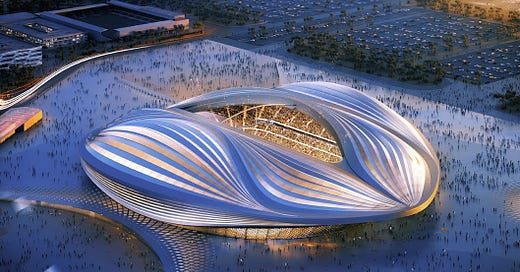World Cup 2022: What’s In It For Qatar?
Dictators associating their brand with popular sports is a century-old phenomenon
Hussain Abdul-Hussain
1945
To host soccer’s top international competition, held once every four years, Qatar had to spend $300 billion — the equivalent of 170 percent of its GDP — buying not only a brand new infrastructure and seven stadiums, but also a national soccer team of naturalized foreign players, and even spectators. But hosting a global event has also renewed scrutiny of Qatar’s human rights abuses and its repressive Islamic laws , raising the question: Why would autocrats — Russia in 2018 and Qatar this month — spend all this money to host a tournament that trains a spotlight on their flaws?
The short answer is image.
When billions of soccer fans associate their favorite sport with a place or a brand, their perception of it will be generally positive. Only a fraction of those who watch the games will check out media reports on global calls to boycott the tournament because of Doha’s abuses.
The reason why Qatar bribed its way to host the World Cup is the same reason Budweiser has been one of the primary sources of income for the global soccer federation, FIFA. Both want to benefit from the good feelings that come from association with a beloved event. Qatar’s tough restrictions on the consumption of alcohol have led to some tensions with one of the world’s most renowned beer brands, but fans should still be able to buy a cold one.
Another source of tension was the admission by Sepp Blatter, the former FIFA official who awarded Qatar hosting privileges in 2010, that allowing Qatar to host the World Cup was “a mistake” and that “the choice was bad,” reasoning that Qatar was “too small a country” and that soccer “and the World Cup [were] too big for it.”
Qatar is 100 miles, north to south, and 50 miles, east to west. To put such numbers in perspective, consider that during his decades in the Senate, President Joe Biden commuted 100 miles daily between his house in Wilmington, Delaware, and Washington, DC.
World cups are usually hosted in a dozen cities, but Qatar has only one, its capital Doha. During the last three editions of the tournament, over three million fans watched the games in stadiums. Qatar’s population is 2.8 million, only 300,000 of which are citizens.
Qatar’s numbers made the global soccer organization FIFA fear that Doha was biting off more than it could chew. Qatar, however, promised to build 12 stadiums, a new airport, seaport, and metro, and tens of thousands of hotel rooms.
But even a country as rich as Qatar has spending limits. Doha eventually told FIFA that it would build only seven stadiums, and that games will take place in five cities, three of them Doha suburbs. The only town to host games, outside metro Doha, will be Al-Khor, 32 miles to the north. Still, most fans—especially the vast majority who watch on television—are unlikely to learn about Qatar’s struggles to prepare for the Cup.
There is a long history of autocrats hosting major athletic events to burnish their image. In his 1936 essay in Foreign Affairs, “The Dictators Discover Sports,” the journalist John Tunis wrote that European dictators “have cleverly used sports as propaganda.”
The 1934 World Cup was held in Fascist Italy, and through a combination of buying referees and naturalizing foreign players for Italy’s team, Mussolini snatched the trophy for his country. (Qatar is unlikely to be so audacious. Its squad has 12 naturalized players, but multiple victories would be suspicious for such an undistinguished team.)
In 1936, Hitler hosted the Olympics in Berlin. A boycott movement failed, and “Germany had its propaganda coup: The 49 nations who sent teams to the Games legitimized the Hitler regime both in the eyes of the world and of German domestic audiences,” according to the Holocaust Memorial Museum.
At the Winter Olympics in Sochi in 2014 and the World Cup in 2018, Vladimir Putin basked in the limelight of hosting world leaders. (A state-run doping program at Sochi became a major embarrassment, however.)
Some of the scrutiny directed at Qatar has clearly gotten under its leader’s skin. Emir Tamim bin Hamad denounced alleged “fabrications and double standards that were so ferocious.” He also questioned “the real reasons behind the (criticism) campaign,” hinting that negative press was a political hit job.
But once the World Cup kicks off on Sunday, the world’s most popular athletes will be competing and entertaining their fans, who will remember Qatar for hosting the event, not for the moral and ethical compromises that brought the event to Doha.
Hussain Abdul-Hussain is a research fellow at the Foundation for Defense of Democracies (FDD), a Washington, DC-based, nonpartisan research institute focusing on national security and foreign policy. Follow Hussain on Twitter @hahussain




Nice engagement you’re getting on this one man. All this popularity wouldn’t be possible without you being the traitor to your own people that you are, so I hope it was worth it.